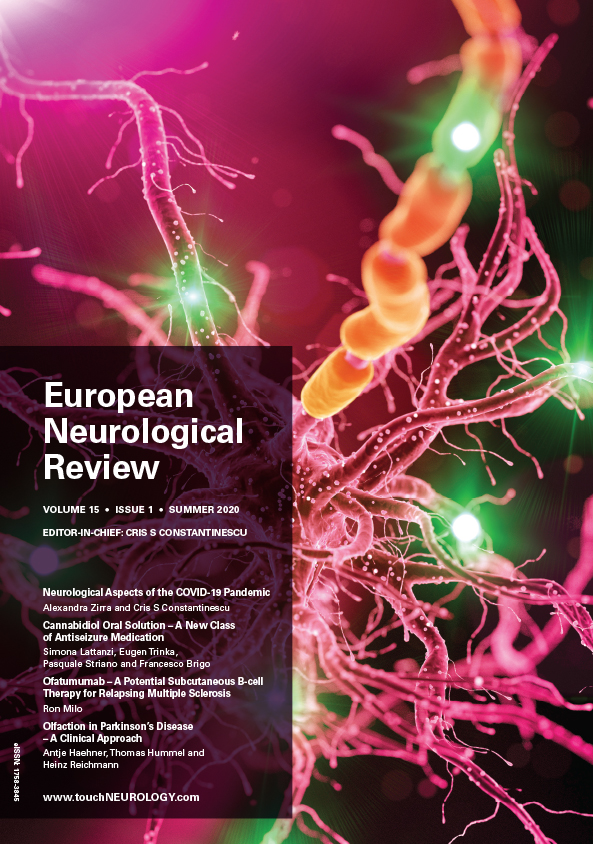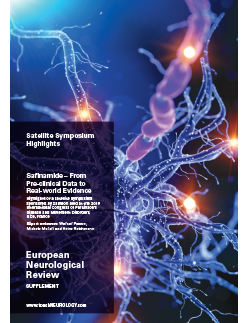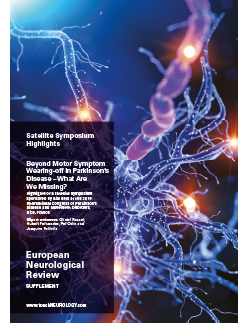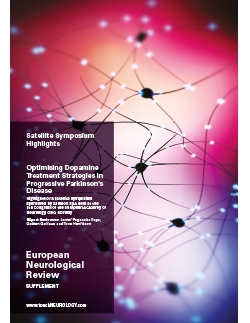
EUROPEAN NEUROLOGICAL DISEASE – VOLUME 2 ISSUE 1 – SUMMER 2007
Advisory Panel
In addition to the panel members below, Touch Briefings would like to thank Tamás Dóczi Past Vice President, European Association of Neurosurgical Societies (EANS) Bruno Vellas Principal Investigator, European Alzheimer’s Disease Consortium (EADC) Mary G Baker President, European Federation of Neurological Associations (EFNA)
Foreword
Neurological diseases cause great distress to European citizens and difficulties in obtaining accurate diagnoses, accessing medication (this is very variable across Europe), being referred to multidisciplinary teams, receiving continuous care and being able to participate in the management of the illness are all major challenges to the families living with neurological disease.
Epilepsy
Q: Women of child-bearing age and pre-menopausal women – what are the main considerations for initiating antiepileptic therapy? Dr James Morrow: The primary considerations for antiepileptic therapy in men and women are similar vis-à-vis efficacy. Everybody wants an effective drug that will abolish seizures. The choice of drug in this respect often depends on seizure […]
Epilepsy affects up to 1% of the world’s population. It is not a singular disease, but a variety of disorders reflecting underlying brain dysfunction that may result from myriad causes. The latest proposal by the International League Against Epilepsy (ILAE) defines epilepsy as the occurrence of at least one seizure with an enduring alteration in […]
Proposed Mechanisms of Vagus Nerve StimulationThe mechanism by which VNS exerts its effect has not been fully elucidated.However, several studies have shed light on possible mechanisms of VNS action (for recent reviews see references 8 and 9). Vagus nerve afferents are made up of three fiber types: large-diameter, myelinated A-fibers; intermediate-diameter, myelinated B-fibers; and small-diameter, […]
Multiple Sclerosis
The approval of three interferons-beta (IFNβ) and of glatiramer acetate (GA) by the US Food and Drug Administration (FDA) in the early 1990s was the most important recent advance in multiple sclerosis (MS) therapy. These immunomodulators are now a first-line treatment of relapsing-remitting (RR) and relapsing-progressive (RP) MS. In 2000, mitoxantrone – a cytolytic immunosuppressant […]
As the title of the project suggests, Multiple Sclerosis – Information Dividend (MS-ID) concerns information about multiple sclerosis (MS) and the benefits to be gained from such information. In Europe, very limited data are gathered about MS, its incidence, who is affected by it, who is taking which drugs as treatment, how MS impacts on […]
Stroke
As President of Stroke Alliance for Europe, my focus is naturally on stroke. According to the World Health Organization, stroke kills more than 5 million people a year worldwide and disables an additional 5–6 million people a year. Research into acute stroke treatment and rehabilitation is progressing, but there is still a long way to […]
Stroke is the second most common cause of death worldwide and a leading cause of long-term neurological impairment, with as many as 30% of survivors permanently disabled.1–3 Of all strokes, approximately 70% are first-time events, thus primary-care physicians have a great opportunity to identify patients who may benefit from risk factor modification.2 Furthermore, neurologists frequently […]
Neurosurgery
Intra-operative control of vessel patency and/or successful exclusion of vascular lesions are major goals in neurovascular procedures. Direct intra-operative inspection may fail.1–4
Cyberknife Radiosurgery – Overview
Neuropathic Pain
Historical Perspective
Alzheimer’s Disease
Alzheimer’s disease (AD) is a progressive, age-related neurodegenerative disorder resulting in major disability and dependence that is devastating for the patient, care-givers and family. It is characterised by memory problems, executive dysfunction, dysphasia, apraxia, agnosia and visuospatial difficulties. This can lead to the emergence of behavioural disturbances such as agitation, aggression, delusions, wandering and apathy, […]
Existing Treatments for Alzheimer’s Disease in Europe No drug treatments can cure Alzheimer’s disease or the other common forms of dementia. However, drug treatments have been developed that can temporarily slow the progression of symptoms in some people with Alzheimer’s disease. Donepezil, rivastigmine and galantamine all work in a similar way and are known as […]
Parkinson’s Disease
The concept of continuous dopaminergic stimulation (CDS) is presently the aim of most pharmacotherapy for Parkinson’s disease (PD). The theoretical background to CDS is that the physiological striatal dopaminergic stimulation is constant and that oral therapy with levodopa in PD can replace dopaminergic stimulation only in an intermittent, non-physiological manner.1,2 This pulsatile stimulation of the […]
Events Diary
2008 26–31 July 11th International Conference on Alzheimer’s Disease Chicago, IL, US www.alz.org/icad 17–22 August 12th World Congress on Pain Glasgow, Scotland www.iasp-pain.org 23–26 August 12th Congress of the European Federation of Neurological Societies Madrid, Spain www.kenes.com/efns 12–14 September 8th European Association of Neuro-oncology Congress Barcelona, Spain www.medacad.org/eano2008
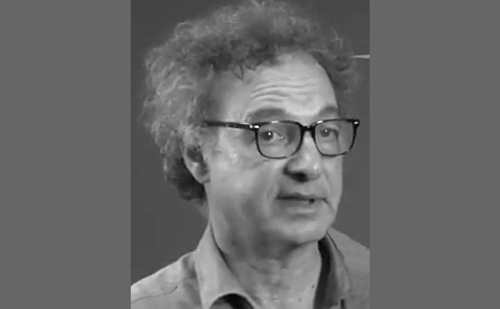
Trending Topic
Welcome to the latest edition of European Neurological Review, which features a wide range of articles of interest to neurologists and other practitioners involved in the care of patients with neurological illness. As we move into a new decade, the field of neurology continues to face fresh challenges. Despite an increased understanding of the pathophysiological […]
Journal Archive
European Neurological Review is a peer-reviewed, free-to-access, bi-annual neurology journal comprising review articles, case reports, practice guides, theoretical discussions, and original research. It features balanced and comprehensive articles written by leading authorities, addressing the most important and salient developments in the field of neurology in practical terms.
Latest articles videos and clinical updates - straight to your inbox
Log into your Touch Account
Earn and track your CME credits on the go, save articles for later, and follow the latest congress coverage.
Register now for FREE Access
Register for free to hear about the latest expert-led education, peer-reviewed articles, conference highlights, and innovative CME activities.
Sign up with an Email
Or use a Social Account.
This Functionality is for
Members Only
Explore the latest in medical education and stay current in your field. Create a free account to track your learning.


